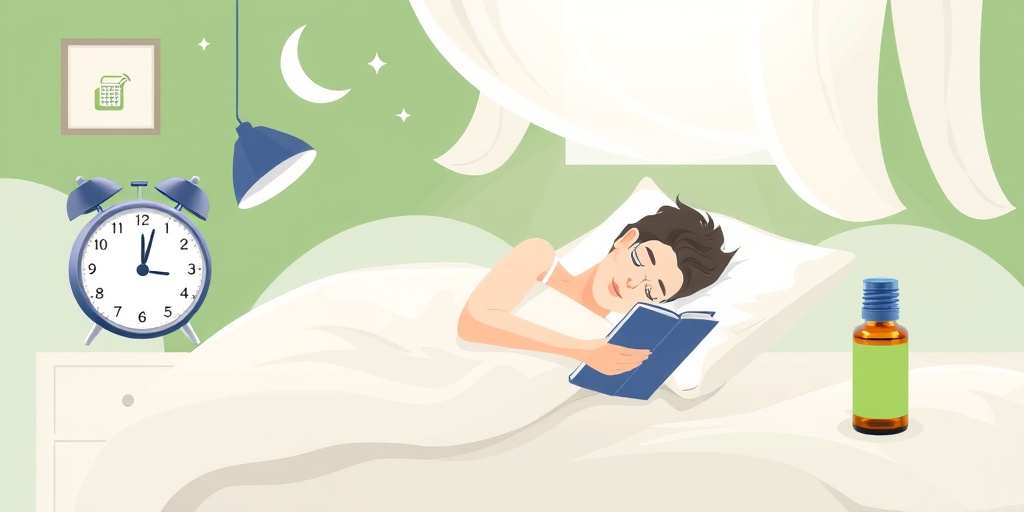Understanding Sleep
Sleep is a fundamental aspect of our lives, yet many of us take it for granted. Understanding sleep is the first step towards improving your sleep and overall health. Sleep is not just a passive state of rest; it is a complex biological process that plays a crucial role in our physical and mental well-being.
The Sleep Cycle
Our sleep is divided into several stages, primarily categorized into two types: REM (Rapid Eye Movement) and non-REM sleep. Each cycle lasts about 90 minutes and typically includes:
- Stage 1: Light sleep, where you drift in and out of sleep.
- Stage 2: A deeper sleep where your heart rate slows, and body temperature drops.
- Stage 3: Deep sleep, essential for physical recovery and growth.
- REM Sleep: The stage where dreaming occurs, crucial for cognitive functions like memory and learning.
Understanding these stages can help you recognize the importance of a full sleep cycle and how it contributes to improving your sleep quality. Disruptions in this cycle can lead to feelings of fatigue and decreased performance during the day.
Factors Affecting Sleep
Several factors can influence your sleep quality, including:
- Stress and Anxiety: High levels of stress can make it difficult to fall asleep and stay asleep.
- Environment: Noise, light, and temperature can significantly impact your ability to sleep well.
- Diet: Consuming heavy meals, caffeine, or alcohol close to bedtime can disrupt your sleep cycle.
- Screen Time: The blue light emitted by phones and computers can interfere with your body’s natural sleep-wake cycle.
By understanding these factors, you can take proactive steps to create a sleep-friendly environment and routine, ultimately leading to improved sleeping habits.
Benefits of Quality Sleep
Quality sleep is not just about feeling rested; it has profound effects on your overall health and well-being. Here are some key benefits of prioritizing your sleep:
Physical Health
Getting enough quality sleep is essential for maintaining a healthy body. It helps:
- Boost Immune Function: Sleep strengthens your immune system, making you less susceptible to illnesses.
- Support Weight Management: Lack of sleep can disrupt hormones that regulate appetite, leading to weight gain.
- Enhance Recovery: Sleep is crucial for muscle repair and recovery after physical activity.
Mental Well-Being
Quality sleep is equally important for your mental health. It can:
- Improve Mood: A good night’s sleep can help regulate emotions and reduce irritability.
- Enhance Cognitive Function: Sleep plays a vital role in memory consolidation and learning.
- Reduce Stress: Adequate sleep can lower stress levels and improve your ability to cope with challenges.
Long-Term Health Benefits
Consistently getting quality sleep can lead to long-term health benefits, including:
- Lower Risk of Chronic Diseases: Quality sleep is linked to a reduced risk of conditions such as heart disease, diabetes, and hypertension.
- Improved Longevity: Studies suggest that those who prioritize sleep tend to live longer, healthier lives.
Incorporating strategies to improve your sleep naturally can lead to these significant benefits. For more evidence-based health answers, consider visiting Yesil Health AI, a valuable resource for understanding how to enhance your health through better sleep practices.
In conclusion, understanding sleep and recognizing its benefits is crucial for anyone looking to enhance their overall health. By making small adjustments to your sleep environment and habits, you can significantly improve your sleep quality and, in turn, your quality of life. 🌙💤

Common Sleep Disorders
Understanding how to improve your sleep starts with recognizing the common sleep disorders that might be affecting your rest. Sleep disorders can significantly impact your overall health and well-being, making it essential to identify and address them. Here are some of the most prevalent sleep disorders:
1. Insomnia
Insomnia is one of the most common sleep disorders, characterized by difficulty falling asleep, staying asleep, or waking up too early. People with insomnia often feel tired during the day, which can affect their mood and productivity. Causes of insomnia can range from stress and anxiety to medical conditions and certain medications.
2. Sleep Apnea
Sleep apnea is a serious condition where breathing repeatedly stops and starts during sleep. This disorder can lead to fragmented sleep and low oxygen levels in the body, resulting in daytime fatigue and other health issues. Common symptoms include loud snoring, gasping for air during sleep, and excessive daytime sleepiness.
3. Restless Legs Syndrome (RLS)
Restless Legs Syndrome is characterized by an uncontrollable urge to move the legs, often accompanied by uncomfortable sensations. This condition typically worsens during periods of inactivity, especially at night, making it difficult to fall asleep. RLS can significantly disrupt sleep quality and overall health.
4. Narcolepsy
Narcolepsy is a neurological disorder that affects the brain’s ability to regulate sleep-wake cycles. People with narcolepsy experience excessive daytime sleepiness and may have sudden sleep attacks, even during activities like talking or driving. This disorder can severely impact daily life and requires medical intervention.
5. Circadian Rhythm Disorders
Circadian rhythm disorders occur when the body’s internal clock is out of sync with the external environment. This can lead to difficulties in falling asleep or waking up at desired times. Shift work, jet lag, and irregular sleep schedules are common causes of these disorders.
Sleep Hygiene Practices
Improving your sleep quality often involves adopting better sleep hygiene practices. Sleep hygiene refers to the habits and environmental factors that promote consistent, uninterrupted sleep. Here are some effective strategies to enhance your sleep hygiene:
1. Create a Sleep Schedule
Establishing a consistent sleep schedule is crucial for improving your sleep cycle. Go to bed and wake up at the same time every day, even on weekends. This helps regulate your body’s internal clock, making it easier to fall asleep and wake up refreshed.
2. Optimize Your Sleep Environment
Your bedroom should be a sanctuary for sleep. Consider the following tips to optimize your sleep environment:
- Keep it dark: Use blackout curtains or an eye mask to block out light.
- Control the temperature: A cool room (around 60-67°F or 15-19°C) is ideal for sleep.
- Minimize noise: Use earplugs or a white noise machine to drown out disruptive sounds.
3. Limit Screen Time Before Bed
The blue light emitted by phones, tablets, and computers can interfere with your body’s production of melatonin, the hormone responsible for sleep. Aim to turn off screens at least an hour before bedtime to help your body prepare for sleep.
4. Establish a Relaxing Bedtime Routine
Engaging in calming activities before bed can signal to your body that it’s time to wind down. Consider incorporating practices such as:
- Reading a book 📚
- Taking a warm bath 🛁
- Practicing meditation or deep breathing exercises 🧘♀️
5. Be Mindful of Food and Drink
What you consume can significantly impact your sleep quality. Here are some tips:
- Avoid large meals: Eating heavy meals close to bedtime can cause discomfort and disrupt sleep.
- Limit caffeine and nicotine: Both are stimulants that can interfere with your ability to fall asleep.
- Stay hydrated: However, try to limit fluid intake right before bed to minimize nighttime trips to the bathroom.
By understanding common sleep disorders and implementing effective sleep hygiene practices, you can take significant steps toward improving your sleep and enhancing your overall health. Sweet dreams await! 🌙✨

Creating a Sleep-Friendly Environment
One of the most effective ways to improve your sleep is by creating a sleep-friendly environment. Your bedroom should be a sanctuary that promotes relaxation and restfulness. Here are some key elements to consider:
1. Optimize Your Bedroom Temperature
The ideal temperature for sleep is typically between 60°F and 67°F (15°C to 19°C). A cooler room can help lower your body temperature, signaling that it’s time to sleep. Consider using a fan or air conditioning during warmer months, and cozy blankets during colder months to maintain a comfortable temperature.
2. Control Light Exposure
Light plays a crucial role in regulating your sleep cycle. To improve your sleep quality, keep your bedroom dark. Use blackout curtains to block outside light and consider using a sleep mask if necessary. Additionally, limit exposure to screens (phones, tablets, TVs) at least an hour before bedtime, as the blue light emitted can interfere with melatonin production.
3. Reduce Noise Levels
Noise can be a significant disruptor of sleep. To create a peaceful environment, consider the following:
- Use earplugs or a white noise machine to drown out disruptive sounds.
- Consider soft background music or nature sounds to promote relaxation.
4. Invest in Comfortable Bedding
Your mattress and pillows play a vital role in your sleep experience. Ensure that your mattress is supportive and comfortable, and choose pillows that suit your sleeping position (back, side, or stomach). High-quality bedding can make a significant difference in how well you sleep.
5. Keep Your Bedroom Clutter-Free
A tidy space can lead to a tidy mind. Clutter can create feelings of stress and anxiety, making it harder to relax. Take some time to declutter your bedroom, keeping only items that promote relaxation and comfort.
6. Incorporate Calming Scents
Scents can have a powerful impact on your mood and sleep quality. Consider using essential oils like lavender, chamomile, or sandalwood in a diffuser or as pillow sprays. These scents can help create a calming atmosphere conducive to sleep.
Relaxation Techniques for Sleep
In addition to creating a sleep-friendly environment, incorporating relaxation techniques into your nightly routine can significantly improve your sleep. Here are some effective methods to help you unwind before bed:
1. Practice Deep Breathing
Deep breathing exercises can help calm your mind and body. Try this simple technique:
- Inhale deeply through your nose for a count of four.
- Hold your breath for a count of four.
- Exhale slowly through your mouth for a count of six.
- Repeat this cycle several times until you feel relaxed.
2. Engage in Gentle Stretching or Yoga
Gentle stretching or yoga can help release tension in your muscles and promote relaxation. Focus on stretches that target areas where you hold stress, such as your neck, shoulders, and back. A few minutes of yoga can help prepare your body for sleep.
3. Meditate or Practice Mindfulness
Meditation and mindfulness practices can help quiet your mind and reduce anxiety. Consider setting aside 5-10 minutes before bed to meditate. You can use guided meditation apps or simply focus on your breath and let go of any racing thoughts.
4. Read a Book
Reading can be a great way to unwind and escape from the stresses of the day. Choose a book that interests you but isn’t too stimulating. Avoid reading on electronic devices to minimize blue light exposure.
5. Listen to Soothing Music or Sounds
Soft music or nature sounds can create a calming atmosphere. Create a playlist of your favorite relaxing tunes or explore apps that offer ambient sounds like rain, ocean waves, or forest sounds. This can help signal to your body that it’s time to wind down.
6. Establish a Consistent Bedtime Routine
Having a consistent bedtime routine can signal to your body that it’s time to sleep. Aim to go to bed and wake up at the same time every day, even on weekends. This consistency can help regulate your sleep cycle and improve your overall sleep quality.
By implementing these strategies, you can create a sleep-friendly environment and incorporate relaxation techniques that will help you improve your sleep and wake up feeling refreshed and rejuvenated. 🌙✨

Diet and Sleep Connection
When it comes to how to improve your sleep, many people overlook the significant role that diet plays in achieving a restful night. The foods you consume can either enhance or disrupt your sleep quality. Let’s explore the intricate connection between diet and sleep, and how making mindful choices can lead to better sleep hygiene.
The Impact of Food on Sleep Quality
Your body requires specific nutrients to function optimally, and this includes getting quality sleep. Certain foods can promote relaxation and help regulate your sleep cycle, while others can lead to restlessness and insomnia. Here are some key dietary components to consider:
- Magnesium: This mineral is known for its calming properties. Foods rich in magnesium, such as leafy greens, nuts, seeds, and whole grains, can help relax your muscles and nerves, making it easier to drift off to sleep.
- Trytophan: An amino acid found in turkey, chicken, dairy products, and nuts, tryptophan is a precursor to serotonin, which is converted into melatonin, the hormone responsible for regulating sleep.
- Complex Carbohydrates: Foods like oatmeal, whole grain bread, and brown rice can help increase the availability of tryptophan in the brain, promoting better sleep.
- Antioxidants: Fruits and vegetables, particularly berries, cherries, and leafy greens, are rich in antioxidants that can help reduce inflammation and improve sleep quality.
Foods to Avoid Before Bed
While some foods can enhance your sleep, others can have the opposite effect. Here are some items to steer clear of in the hours leading up to bedtime:
- Caffeine: Found in coffee, tea, chocolate, and some sodas, caffeine is a stimulant that can keep you awake. Aim to avoid caffeine at least six hours before bedtime.
- Heavy Meals: Eating large or rich meals can lead to discomfort and indigestion, making it difficult to fall asleep. Try to have your last meal at least two to three hours before bed.
- Alcohol: While it may initially make you feel drowsy, alcohol can disrupt your sleep cycle and lead to poor sleep quality.
Hydration and Sleep
Staying hydrated is essential for overall health, but drinking too much fluid right before bed can lead to frequent trips to the bathroom during the night. Aim to hydrate throughout the day and limit fluid intake in the evening to improve your sleep pattern.
When to Seek Help
Despite making dietary changes and practicing good sleep hygiene, some individuals may still struggle with sleep issues. Knowing when to seek help is crucial for your overall well-being. Here are some signs that it may be time to consult a healthcare professional:
Persistent Sleep Problems
If you find yourself consistently having trouble falling asleep, staying asleep, or waking up too early, it may indicate an underlying sleep disorder. Conditions such as insomnia, sleep apnea, or restless leg syndrome can significantly impact your quality of life and require professional intervention.
Daytime Fatigue
Feeling excessively tired during the day, even after a full night’s sleep, can be a sign that your sleep quality is poor. If you’re relying on caffeine or naps to get through the day, it’s time to evaluate your sleep habits and consider seeking help.
Emotional and Mental Health Concerns
Sleep issues can often be linked to mental health conditions such as anxiety and depression. If you notice that your sleep problems are affecting your mood, relationships, or daily functioning, it’s essential to reach out to a mental health professional.
Sleep Diary
Before seeking help, consider keeping a sleep diary for a couple of weeks. Document your sleep patterns, dietary habits, and any lifestyle factors that may be affecting your sleep. This information can be invaluable for healthcare providers in diagnosing and treating your sleep issues.
Improving your sleep is a multifaceted approach that includes dietary changes, lifestyle adjustments, and, when necessary, professional help. By understanding the connection between diet and sleep, and recognizing when to seek assistance, you can take significant steps toward achieving the restful nights you deserve. 🌙✨

Frequently Asked Questions (FAQ)
How can I improve my sleep quality?
Improving your sleep quality involves several strategies, including:
- Establishing a consistent sleep schedule: Go to bed and wake up at the same time every day.
- Creating a relaxing bedtime routine: Engage in calming activities before sleep, such as reading or meditating.
- Optimizing your sleep environment: Ensure your bedroom is dark, quiet, and cool.
- Limiting screen time: Avoid screens at least an hour before bedtime to reduce blue light exposure.
What are some tips to improve my sleep cycle?
To enhance your sleep cycle, consider the following:
- Maintain a regular sleep schedule: Stick to your sleep and wake times, even on weekends.
- Limit naps: If you nap, keep it short (20-30 minutes) and avoid late afternoon naps.
- Get natural light exposure: Spend time outdoors during the day to help regulate your internal clock.
How can I improve my sleep hygiene?
Improving your sleep hygiene can significantly impact your sleep quality. Here are some tips:
- Keep your bedroom for sleep: Avoid using your bed for work or watching TV.
- Limit caffeine and alcohol: Reduce intake, especially in the hours leading up to bedtime.
- Exercise regularly: Aim for at least 30 minutes of physical activity most days, but avoid vigorous exercise close to bedtime.
What are natural ways to improve sleep?
To improve your sleep naturally, try these methods:
- Herbal teas: Consider chamomile or valerian root tea before bed.
- Aromatherapy: Use essential oils like lavender to promote relaxation.
- Mindfulness and meditation: Practice mindfulness techniques to calm your mind before sleep.
How can I improve my sleep score?
Improving your sleep score involves tracking your sleep patterns and making adjustments. Here are some suggestions:
- Use a sleep tracker: Monitor your sleep duration and quality to identify patterns.
- Set sleep goals: Aim for 7-9 hours of quality sleep each night.
- Evaluate your sleep environment: Make necessary changes to enhance comfort and reduce disturbances.
How can I improve my sleep at night?
To enhance your nighttime sleep, consider these strategies:
- Limit heavy meals: Avoid large meals close to bedtime.
- Establish a wind-down period: Spend 30-60 minutes relaxing before bed.
- Keep a sleep diary: Track your sleep habits and identify factors that affect your sleep.
How can I improve my sleep pattern?
Improving your sleep pattern can be achieved through:
- Gradual adjustments: If you need to change your sleep time, do it gradually by 15-30 minutes each night.
- Consistent wake-up time: Wake up at the same time every day to reinforce your body’s natural rhythm.
- Limit stimulants: Reduce caffeine and nicotine intake, especially in the afternoon and evening.
By implementing these strategies, you can effectively improve your sleep and enjoy better overall health and well-being. 🌙




